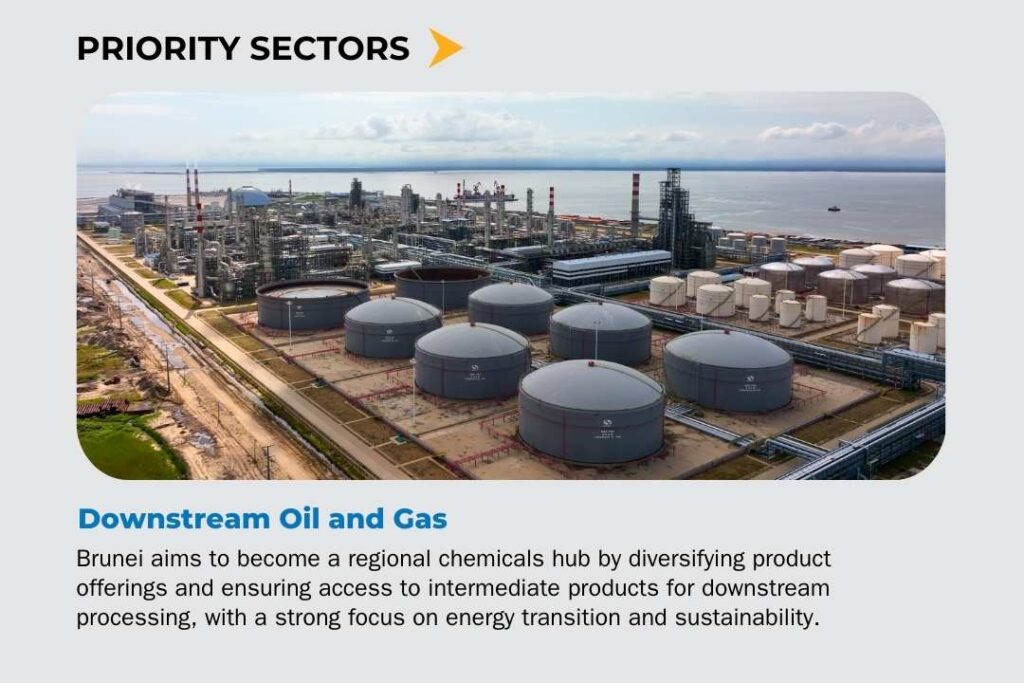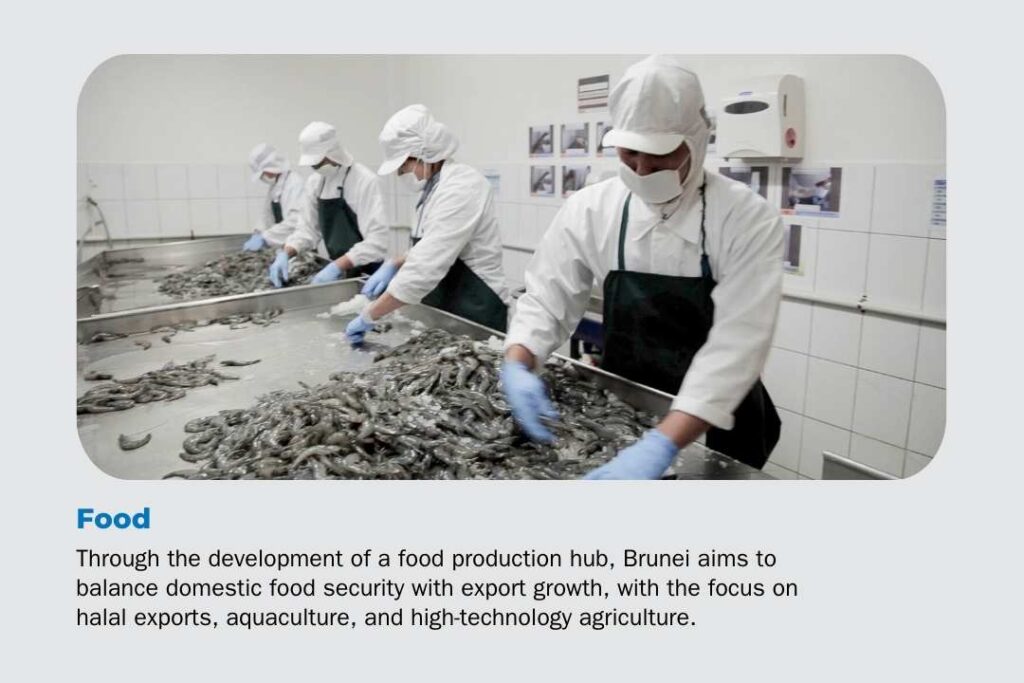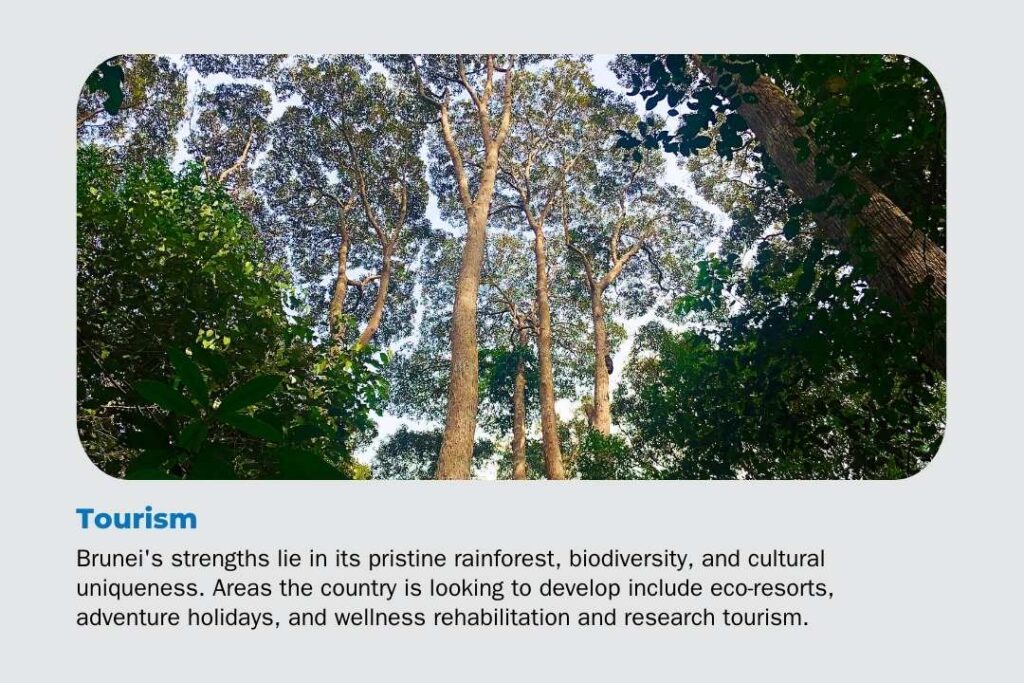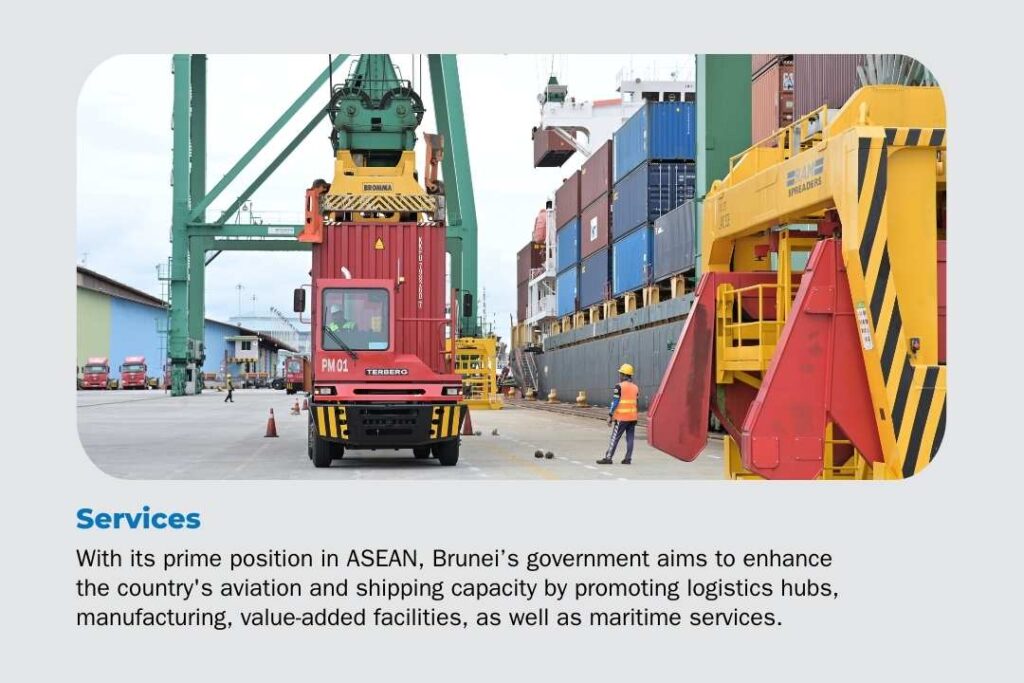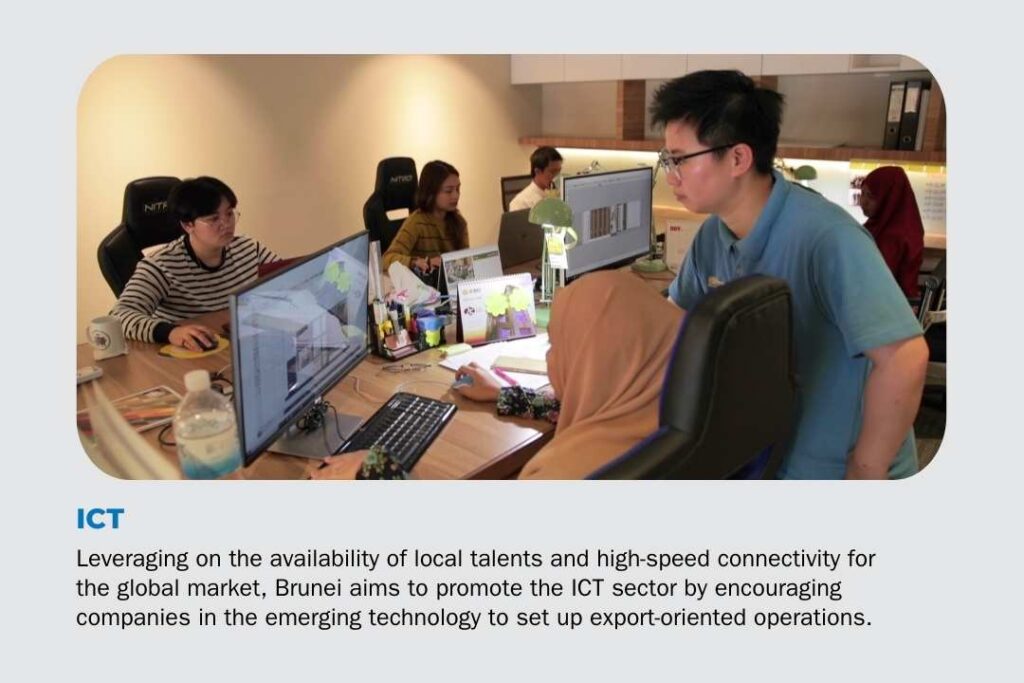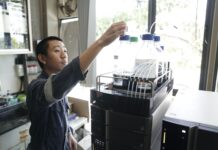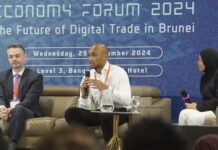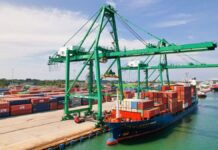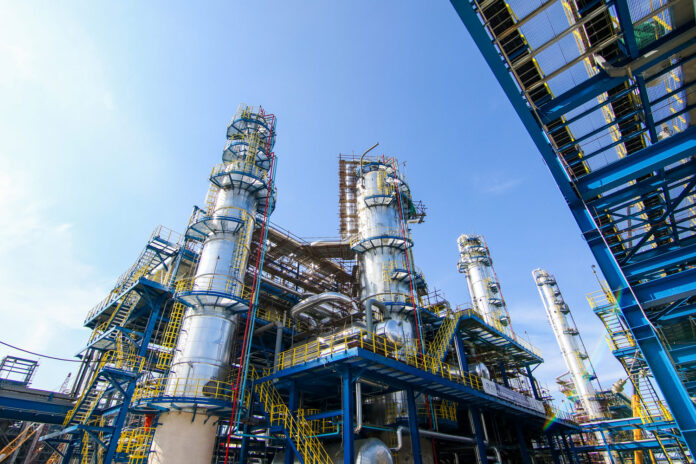
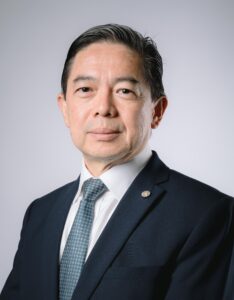
Could you discuss the strategic objectives and main undertakings of the Ministry of Finance and Economy since your appointment as Second Minister?
Our ministry has continued to advance the fiscal consolidation agenda, building on the longstanding responsibilities of the finance portfolio. Fiscal consolidation involves promoting public-private partnerships (PPPs) and corporatizing certain services within Brunei’s government. This aims to enhance efficiency and accountability in our operations, ensuring that the services meet the general public’s expectations.
By increasing productivity and efficiency, organizations can potentially raise their own funds to expand operations, reducing dependence on the government. This benefits multiple parties, including the government, the general public, and the company. It provides clarity to workers about the company’s direction, objectives, and performance. This approach contributes to the optimal utilization of public finances.
In the Ministry of Finance and Economy (MoFE), we actively promote collaboration among various ministries to enhance efficiency and avoid unnecessary duplication of efforts. We aim to optimize available resources and achieve the same or better outcomes with fewer financial resources.
This collaborative approach is in line with His Majesty’s repeated calls for not just a whole-of-government, but whole-of-nation approach needed to achieve our national vision Wawasan 2035.
The primary responsibility of the finance portfolio is to ensure efficiency and optimal resource utilization. Additionally, the ministry oversees the country’s economy, which has relied on oil and gas production for over 90 years. Recognizing the need for economic diversification, we are actively working towards this goal.
Diversifying our economy serves multiple objectives, including reducing dependence on oil and gas. A key aim is establishing a dynamic economy, avoiding over-concentration in one or two industries. This approach provides diverse job opportunities, allowing individuals to pursue professions outside the oil and gas sector. A dynamic economy accommodates various career interests and ideas, enabling people to explore opportunities in different fields.
Encouraging innovation in various areas is crucial for our economy. We aim to promote such initiatives. It is essential to assess our current strengths and weaknesses to shape the future of our economy. This evaluation forms the basis for understanding the state of our economy.
We recognized the need for a gradual transition, so we introduced an economic blueprint in early 2021. Considering our strategic location, small population, and longstanding reliance on oil and gas, we assessed realistic sectors for diversification. It is important to acknowledge that transitioning from oil and gas to new industries requires a gradual yet persistent and consistent effort. Allowing the economy sufficient time to adapt is crucial during this transition.
Through in-depth discussions with various ministries, we identified five sectors for economic diversification. One of these sectors is downstream oil and gas, specifically focusing on areas such as chemical plants. This allows oil and gas industry engineers to transition naturally to the downstream sector, leveraging their expertise in a familiar field.
Another sector identified for diversification is the food industry. Given the heightened importance of food security post-COVID-19, this sector has become a crucial agenda for many countries, including Brunei. As a small nation heavily reliant on food imports, we see potential for growth in this industry. Historically, Brunei’s industry was dominated by fisheries, with many people engaged in fishing, especially in the water village. This sector holds promise for economic development.
The fisheries industry has evolved significantly, and relying solely on open-sea catches is no longer sustainable, especially considering overfishing in the region. Acknowledging this, we emphasize the importance of aquaculture. With its clean water and suitable temperature, Brunei is well-suited for aquaculture. Over the years, we have made substantial developments in this area. Additionally, we are investing in agriculture, cultivating vegetables, fruits, and paddy to enhance food security.
In addition to aquaculture and agriculture, we have a thriving poultry industry. While the variety of fish may be limited, our quantity is substantial, ensuring an adequate protein supply, especially during crises. Similarly, our fruit and vegetable production, though not highly diverse, is sufficient to meet a significant percentage of local needs. Our focus remains on ensuring a consistent and reliable food supply for the population.
Expanding our focus on exports, we have already successfully exported chicken eggs to Singapore. Building on this, we are exploring additional opportunities for collaboration with Singapore and other countries in the region. We aim to diversify our export markets and strengthen partnerships with neighboring countries to boost our agricultural and poultry industries further.
Recognizing the importance of technology in the modern era, we are actively developing strategies to advance the Information and Communication Technology (ICT) sector. While there is a considerable catch-up, we believe it is a crucial industry to focus on. Additionally, the tourism sector holds great potential, especially with the connectivity provided by the bridge linking two parts of Brunei. The smaller part, Temburong, offers unique tourism development opportunities.
We see significant potential in ecotourism and believe Brunei has much to offer regarding unique experiences. Our approach is not to replicate what other countries are doing but to showcase the authentic essence of Brunei. With numerous beauty spots, we are committed to developing and promoting these attractions for a thriving ecotourism sector. There is considerable work ahead, but we are confident in Brunei’s distinctive appeal for visitors seeking genuine and untouched experiences.
Collaboration with external parties is pivotal in advancing various sectors, including services. This encompasses financial services and the ongoing development of maritime services, which is showing promising progress. We aim to further enhance and diversify our services sector by fostering partnerships and engaging with external entities. This collaborative approach contributes to the overall growth and success of these industries in Brunei.
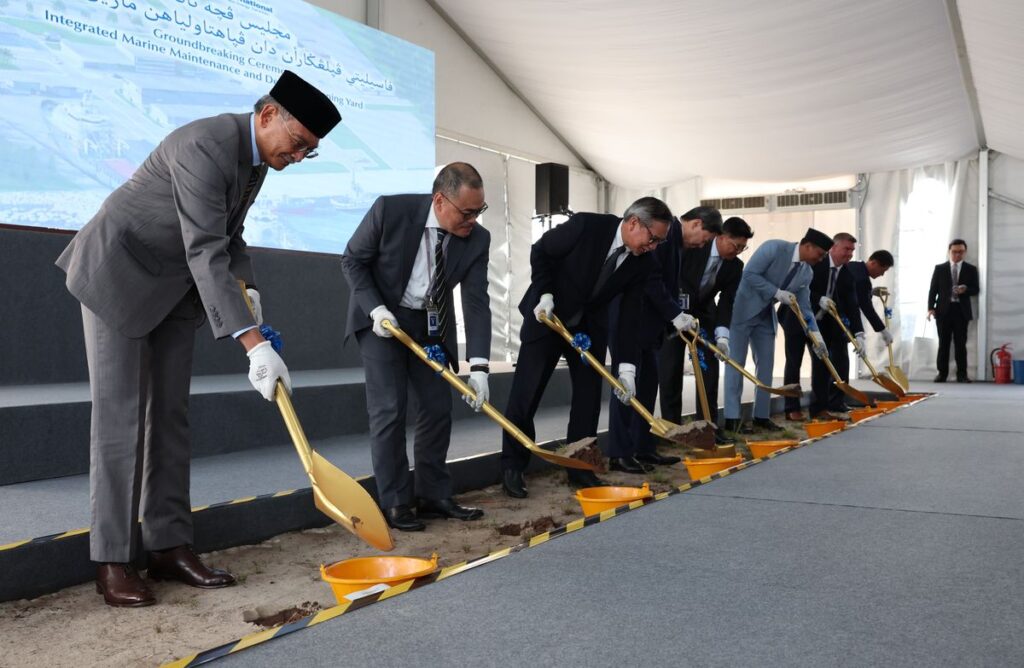
These five identified sectors are integral to our growth strategy. Our fiscal policy is geared towards investing in the future and improving the country’s socio-economic landscape. Year after year, our budget allocation is committed to investing in our people, recognizing that their development is crucial for the success of our economic endeavors. This strategic focus on human capital ensures Brunei’s sustainable and prosperous future.
Investing in the growth of local enterprises is essential to enhance their capabilities. Additionally, to attract more Foreign Direct Investments (FDIs), we are actively working to ensure that our local enterprises are equipped to provide necessary services. This includes assistance with certification, promoting good practices, and ensuring robust governance. By supporting and preparing local businesses, we aim to create an environment where both straightforward and sophisticated services can be readily provided to FDIs, fostering economic growth and development.
During my tenure, we have built upon the foundations laid by previous ministers, ensuring continuity in successful initiatives. Simultaneously, we are introducing new measures to address the evolving challenges in the current environment. This combination of continuity and adaptability is crucial for steering our country towards sustained growth and development.
Launching the economic blueprint has been pivotal in guiding our economic diversification agenda. It outlines our strategic focus on strengthening corporatization, investing in our people, growing local businesses, and attracting more Foreign Direct Investments (FDIs). By following this roadmap, we aim to create a robust economic landscape that will benefit current and future generations, ensuring sustainable growth and prosperity for our country.
How does the vision of Brunei 2035, focusing on core competencies and excluding external factors, influence Brunei’s global standing, and what specific initiatives are you implementing to achieve this under your leadership?
The Brunei Vision 2035 establishes a framework that impacts many aspects of our lives. Upon closer examination, its three main objectives emerge: firstly, fostering the development of an educated, highly skilled, and accomplished population; secondly, ensuring a high quality of life; and finally, establishing a dynamic and sustainable economy.
Indeed, when you compare Brunei’s goals to the United Nations Sustainable Development Goals (UNSDG), which address issues such as eliminating hunger and poverty, providing access to electricity and water, ensuring healthcare, promoting inclusivity, and more, you will find that Brunei has made commendable progress. Our first voluntary national review was conducted in 2018. When I revisited it in New York for the second voluntary national review last year, we can consider that our achievements have been quite satisfactory.
In terms of basic amenities, Brunei has made significant strides. Nearly the entire population, 99.9%, has access to affordable electricity and clean piped water. Healthcare is also accessible to everyone, with ongoing efforts to expand clinics, establish satellite clinics, and build new hospitals in various districts. Furthermore, telecommunication services have reached 99% of the population, showcasing substantial coverage and accessibility.
As of my last check, our mobile network speed initially ranked low in 2018 but has seen remarkable improvement. At one point, we achieved a top 10 global ranking and secured the top spot in ASEAN. However, it is worth noting that other countries are also making advancements, and there may be fluctuations in rankings. While Singapore may have temporarily overtaken us, we continue to compete and strive for excellence. The progress we are making in telecommunication is quite commendable, with a consistently impressive rate of advancement.
Our transportation infrastructure, including roads, is well-developed. I previously mentioned the bridge that connects us to the other part of Brunei, which has a population of only 10,000. Despite the small population, we have prioritized inclusivity and equal economic opportunities for all. The Sultan Haji Omar ‘Ali Saifuddien Bridge’s construction reflects our commitment to ensuring no one is left behind, providing access and opportunities for residents in every part of Brunei.
Similarly, as we connect the two parts of Brunei, it is crucial to preserve the positive aspects of the less developed side. To achieve this, we have established a committee responsible for overseeing the district’s development. The committee ensures that development is managed responsibly and that activities align with our goal of preserving the natural environment and maintaining order. This proactive approach is essential in safeguarding the unique qualities of each region.
Regarding Brunei Vision 2035, the primary focus is cultivating a dynamic and sustainable economy, which we have discussed in detail, including strategies and economic aspects. Now, let us touch on the topic of climate change and sustainability. We firmly believe that fostering economic growth and offering quality job opportunities will naturally encourage individuals to invest in their education and continuously learn. This commitment to lifelong learning enables people to adapt to new opportunities as they arise, ensuring personal growth and contributing to the overall success of our vision.
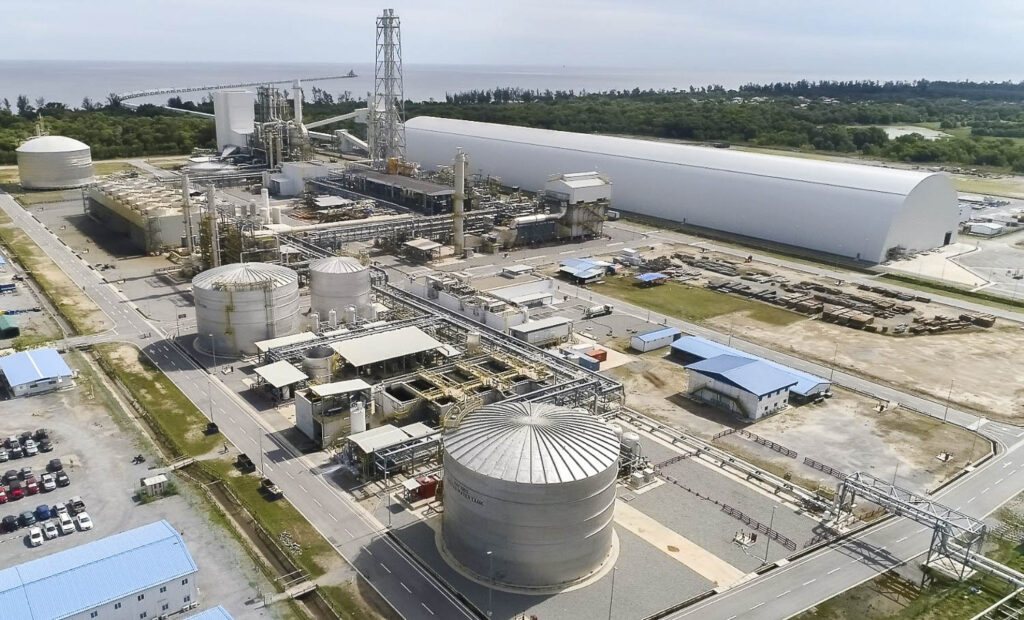
This approach fosters continuous learning and exposes us to diverse industries and collaboration with foreign individuals. This cross-fertilization of ideas enhances our understanding of global affairs and how they impact our actions as a small country. For instance, consider a simple scenario like constructing a fertilizer plant for urea production with export plans. The global scene influences various factors, such as pricing, destinations, and customer relations. Global events can affect shipping costs, create fluctuations, impact customer credit ratings, and more. It emphasizes the interconnectedness of our endeavors with the broader international context.
Engaging in such activities contributes to personal development. It deepens our understanding of economic challenges in other countries and our own. This exposure prompts us to appreciate the potential parallels in our context, fostering the realization that similar challenges could impact us. It underscores the importance of agility, education, and responsiveness to navigate changes effectively. This indirect education becomes a vital tool in preparing our people to be more adaptable, educated, and responsive to evolving circumstances, ultimately contributing to our nation’s overall resilience and success.
Indeed, the economy plays a pivotal role in creating new opportunities and indirectly elevating the standards of our people, enhancing education, and fostering progressive thinking. On the social front, we are committed to continuously upgrading our infrastructure, including healthcare and telecommunication. Our focus extends to improving education, ensuring water quality, and maintaining a stable power supply, among other vital aspects. By addressing these elements comprehensively, we aim to create a robust and well-rounded societal framework that contributes to our nation’s overall well-being and advancement.
While we aggressively expand our economy, ensuring that people actively seize the opportunities presented is crucial. Recognizing the significant investment in education and human resource development, we have incentivized individuals to pursue education. We financially support their studies, emphasizing the importance of continuous self-improvement. The goal is to instill the mindset that ongoing self-upgradation is essential. By fostering this mentality, we aim to empower individuals to actively engage with opportunities rather than letting them slip away, ultimately maximizing the benefits of our economic expansion for both individuals and the nation.
In alignment with the evolving industry landscape, continuous learning becomes imperative. Recently, we revised our pension fund scheme after thorough studies and restructuring. The updated scheme is designed to incentivize prolonged employment, ensuring that individuals who work longer receive enhanced retirement benefits. Recognizing the importance of employment, especially in a country with a relatively small population, where the unemployment rate in 2022 stands at 5.2%, the amended pension scheme encourages individuals to actively contribute to the workforce, securing their retirement and contributing to the overall stability of our economy.
While our unemployment rate is not too low nor too high, it has significantly decreased. It is important to note our unique approach to calculating unemployment. Some countries exclude individuals actively seeking jobs or in transition for less than six months, however, we have included everyone in our calculation, resulting in a rate of 5.2% in 2022.
The success of our economic diversification agenda will play a pivotal role in addressing unemployment concerns. I am confident that success in certain sectors will trigger a positive domino effect, increasing worker demand. To incentivize individuals to actively participate in the workforce, we need to ensure that their efforts are rewarded. Implementing measures such as the revised pension scheme, which emphasizes enhanced retirement benefits for those working longer, is a powerful incentive. By providing a tangible benefit for employment, we aim to encourage individuals to actively contribute to the workforce, ensuring personal and national economic well-being.
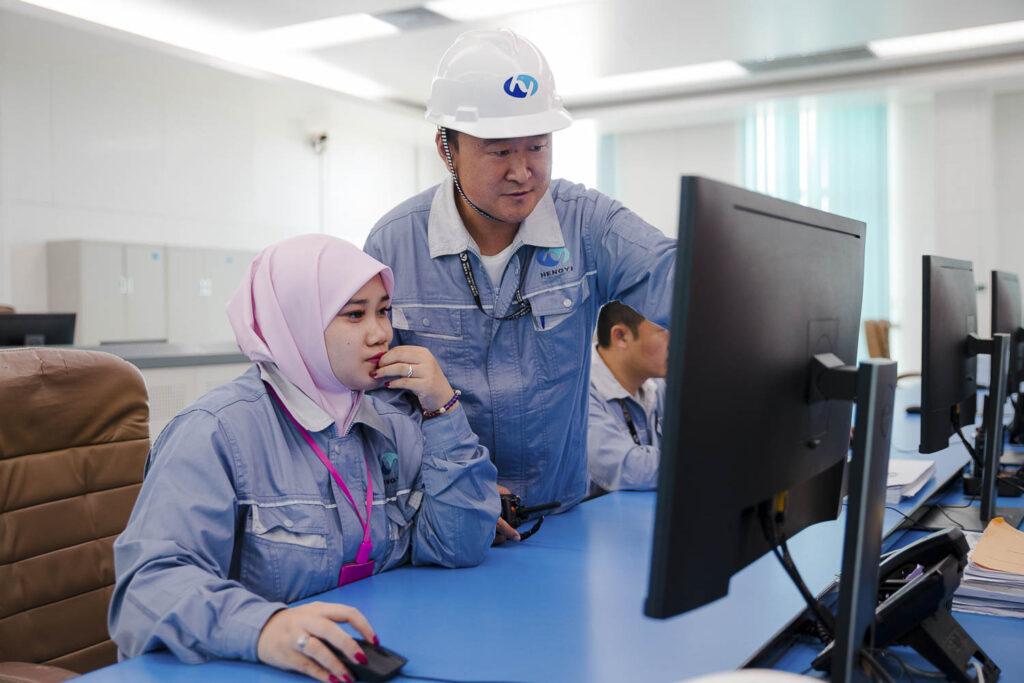
The revised pension scheme aims to ensure that those contributing to the workforce can comfortably retire. Despite these efforts, it is acknowledged that not everyone may fully benefit from economic development. Various factors, such as physical impediments, family issues, or other reasons, may lead to certain individuals being left behind. The social safety net and support systems must be robust enough to assist and uplift those who, for various reasons, may not fully participate in economic advancements. It is committed to ensuring a comprehensive and inclusive approach to societal progress.
We recognized the potential for individuals to be left behind for various reasons, so we collaborated with other ministries to establish a national welfare system. This system is designed to provide support for those who, for reasons such as an inability to work, may face challenges. For those who can work, the emphasis remains on creating ample opportunities, coupled with a retirement scheme that ensures financial security and aligns with the second objective of our vision—ensuring a good quality of life. It is a holistic approach to prevent individuals from facing hardship during retirement after a lifetime of hard work, reinforcing the commitment to sustainable well-being for all.
Ensuring a good quality of life is a commitment that involves continuous government investment in healthcare, education, and infrastructure. Economic diversification contributes to a flourishing economy, creating opportunities for individuals to continually upgrade their skills. This approach leads to a highly educated population, fostering a stage where the overall well-being of the citizens is significantly improved. By prioritizing these foundational elements, the government aims to create an environment where people can thrive, personally and professionally, contributing to the realization of a high-quality life for the population.
Anticipating skepticism in the present, the vision for a high-quality life might seem ambitious. However, it is essential to consider the long-term perspective. The realization of this vision hinges on the success of the economic diversification agenda. Failure is not an option for Brunei, as the imperative is to make this agenda work. The commitment to these long-term goals underscores the determination to create sustained prosperity and well-being for the nation.
Brunei places great importance on collaborating with other countries and maintaining positive global relationships. Our friendly disposition, coupled with a reasonably good education system and widespread proficiency in English, facilitates effective communication and engagement with people from different nations. Many Bruneians have traveled and experienced the world, fostering a global perspective. This exposure enhances our ability to work with foreigners, enabling meaningful conversations and productive collaborations on an international scale.
Brunei’s friendly nature extends to being an active member of ASEAN countries. Additionally, our positive relationships with our other neighbors outside this region and the presence of longstanding Japanese companies like Mitsubishi Gas Chemical, Sumitomo, and Mitsui demonstrate the strong partnerships we have built over the years. With our legal system based on English common law and our educational curriculum delivered in English, our familiarity with the language significantly enhances communication and cooperation on various fronts.
Being near Middle Eastern countries such as Saudi Arabia, Bahrain, Qatar, Oman, and the UAE presents valuable opportunities for collaboration. The key to forming partnerships is identifying mutual needs and areas where each country can complement the other. By understanding regional countries’ specific challenges or requirements, Brunei can explore opportunities to provide support or resources they may be lacking. This approach fosters mutually beneficial partnerships and strengthens economic ties, promoting regional cooperation and development.
Collaborating with smaller countries in the region presents an opportunity for Brunei to leverage its resources and capabilities. Brunei can establish a foothold in these markets by addressing their needs and initiating projects collaboratively. Once established, it provides a foundation to expand and explore opportunities in larger markets such as Japan, China, and Korea. Penetrating a percentage of these markets can significantly contribute to Brunei’s economic growth and international standing. Starting small and growing progressively allows for sustainable development and broader global engagement.
The halal food certification and the quality of seafood that Brunei can produce provide a significant advantage in exploring new markets. As you develop these opportunities, understanding the demand becomes crucial, not just in quantity but also in adhering to certification and regulations specific to each country. It is encouraging to hear that progress is being made in a few countries. As these initiatives gain momentum, we anticipate a substantial increase in market engagement. This proactive approach aligns with the potential for a significant upward trajectory in economic growth as these ventures take off.
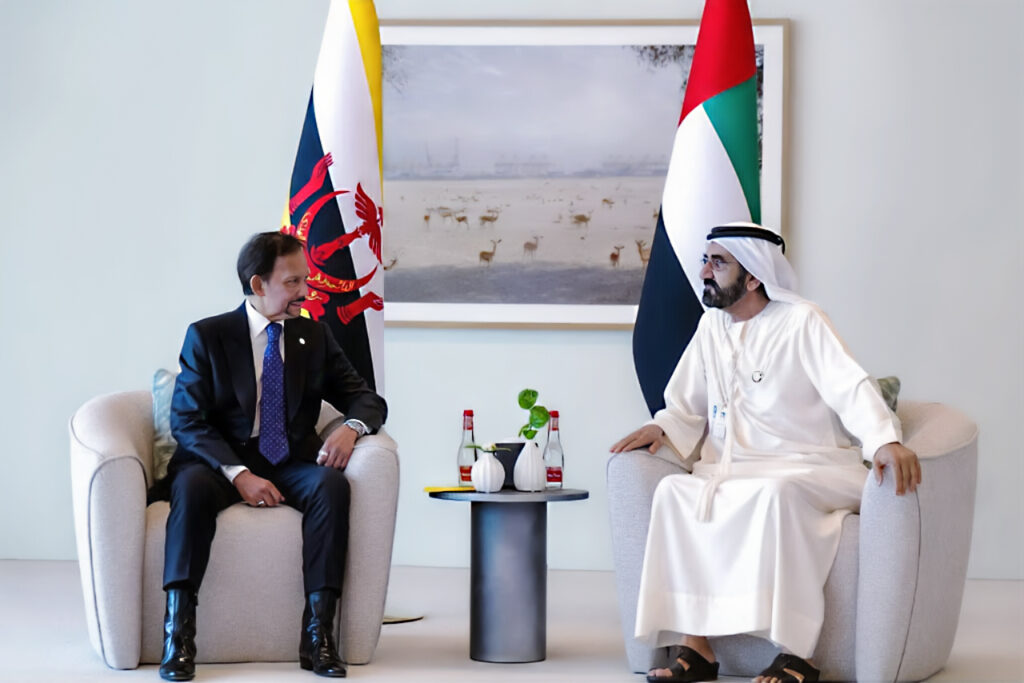
Q: How have bilateral and economic relations between Brunei and the UAE progressed following the fruitful meeting at the World Government Summit, March 2022 in Dubai, where His Majesty Sultan Hassanal Bolkiah and His Highness Sheikh Mohammed Bin Rashid Al Maktoum discussed enhancing ties?
Following the recent meeting, we aim to strengthen the system further. We have previously collaborated with the UAE on various opportunities. This meeting enables us to progress swiftly, having finalized some Memoranda of Understanding at the private sector level. The government serves as a facilitator, emphasizing the crucial role of companies in actualizing initiatives.
We utilize our Government-Linked Companies (GLC) to expedite negotiations, particularly in the transport-related industry. This involves private company collaborations with our GLC. Additionally, we are exploring opportunities in renewable energy.
The Joint Committee Meeting led by the Ministry of Foreign Affairs identifies investment opportunities. Our goal is to collaborate on investments in industries shaping the future economy. By joining forces, we can leverage each other’s strengths for mutual benefit. These ventures align with our long-term objectives. These areas represent our current focus, though we remain open to exploring new opportunities.
What steps is the Ministry of Finance and Economy taking to enhance bilateral trade and foreign direct investment (FDI) within the joint committee you mentioned, aiming for fruitful outcomes?
The Joint Committee Meeting is a bilateral mechanism, co-chaired by the Ministry of Foreign Affairs of our two countries. In preparations for the meeting, the Ministry of Foreign Affairs will compile inputs from relevant agencies including the Ministry of Finance and Economy to convey our intentions for the collaboration. We aim to boost trade, which has been reasonably successful with direct flights from Brunei to Dubai. Over the years, we have endeavored to export halal food products to the UAE.
I discussed the prospect of joint investments in various opportunities, not limited to the UAE or Brunei, focusing on accessing technology relevant to our future goals, such as artificial intelligence. Future industries like renewable energy are also on our radar.
What is your perspective on renewables, particularly solar energy, considering recent developments like Masdar’s 145-megawatt floating solar panel lake, and how do you envision the future growth in this sector?
Solar opportunities are definite. Further study is required for wind, and technological advancements may make it feasible. The wind is under consideration, and we aim to thoroughly evaluate its potential. These initiatives are a priority, and we have established a committee for swift investigation. Additionally, waste-to-energy is an option we are actively exploring.
How does the diversification strategy away from oil and gas align with sustainability initiatives to address climate change concerns, as His Majesty the Sultan mentioned at COP 28?
Like many oil-producing countries, diversification poses a significant challenge to sustainability. COP 28 debates included discussions on the final public statement, emphasizing transitioning away from fossil fuels in energy systems in a fair and orderly manner. The statement acknowledges countries’ varying development stages and industrialization levels to avoid imposing overly restrictive measures.
Brunei acknowledges the importance of environmental preservation and actively participates in addressing climate change. Strategies focus on sustainable practices, such as ensuring aquaculture activities do not harm the environment and partnering with reputable overseas developers for eco-friendly tourism projects.
While recognizing the need to preserve the environment, Brunei seeks a balance that allows people to appreciate it without causing harm. Despite Brunei’s relatively small global emissions (0.017 percent), the government prioritizes addressing climate change. Ongoing studies, mandatory industry emission reporting since May last year, and achieved climate change strategies demonstrate commitment.
Over the past two years, eight out of ten climate change strategies have been achieved, with progress in reducing emissions by approximately 16 percent between 2021 and 2022. Efforts include managing emissions from the existing industries, planting trees, and waste management. Carbon pricing and electric vehicle initiatives are areas where we will see more tangible results over time.
Brunei takes pride in its carbon sink, which consists of vast swamps and mangroves and contributes significantly to emission reduction efforts. These efforts reflect Brunei’s commitment to sustainable practices for future generations.
Could you describe the working culture and environment that you strive to cultivate within your team? What key values and practices do you prioritize to foster effective collaboration and innovation in your ministry?
We strongly believe in leading by example, emphasizing hard work and clear communication. By clearly translating our vision and goals to our team, we ensure everyone understands the purpose behind their tasks, which reduces resistance and fosters cooperation.
Throughout our work, we have always prioritized clarity and the explanation of the rationale behind decisions. Understanding the ‘why’ behind actions — and how we all have a role to play in advancing our country — fosters a sense of shared responsibility.
This approach helps instill confidence and facilitates a shared understanding among all team members. When faced with challenges, we encourage the proposal of solutions backed by sound reasoning, creating an environment where people feel empowered to contribute.
Working with a competent, resourceful, and dedicated team is crucial for effective leadership. We have been fortunate to have such strong support, making the work environment a manageable, enjoyable and ultimately rewarding experience.
This is an extended version of the article published in Gulf News’ Brunei Business Feature on July 29, 2024.


